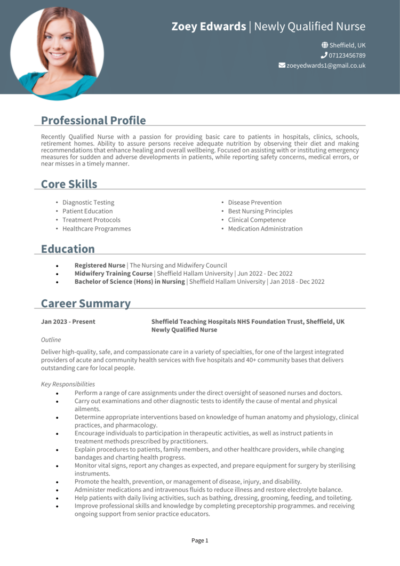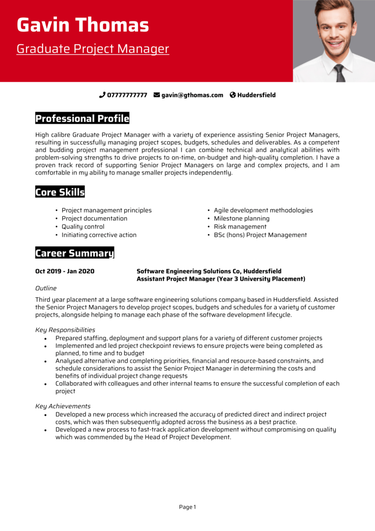You’ve completed your training, survived placement shifts, and learned to juggle compassion, clinical precision, and barely enough sleep. Now, with your registration in hand, it’s time to step into your first official nursing role – and your CV needs to do just as much as you have.
This guide (with a Newly Qualified Nurse CV example) will help you put together a confident, well-structured CV that highlights your practical experience, clinical skills, and passion for patient care – so you can transition smoothly from student to professional nurse.
Newly Qualified Nurse CV
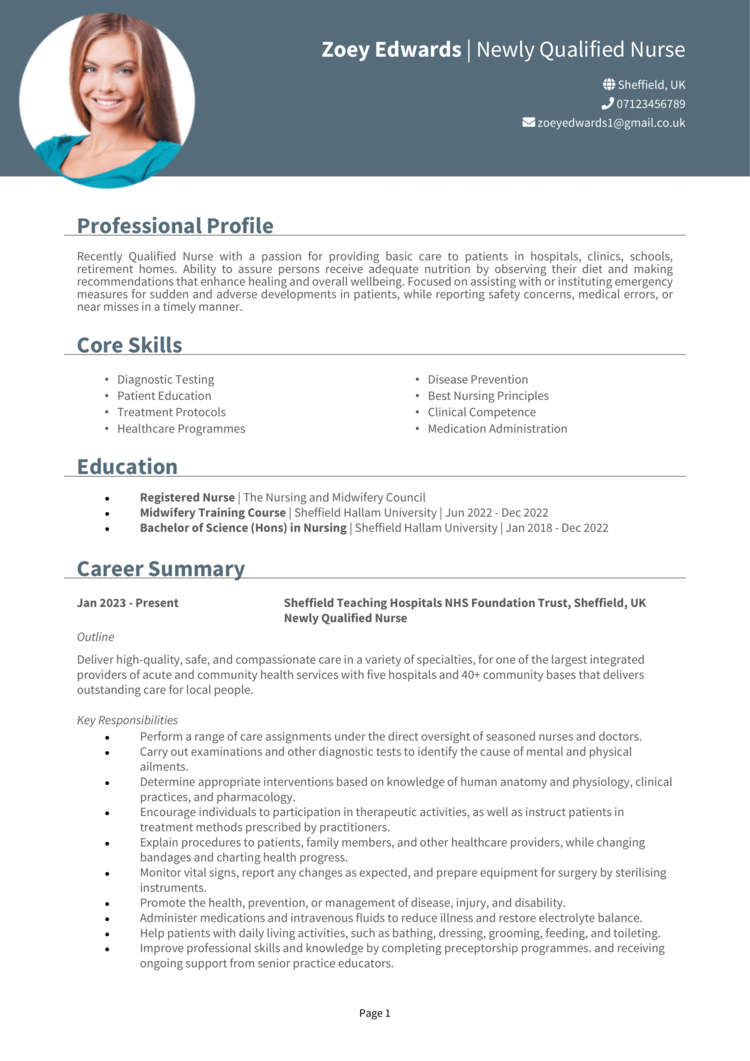
How to write your Newly Qualified Nurse CV
Discover how to craft a winning Newly Qualified Nurse CV that lands interviews with this simple step-by-step guide.
You’ve got the training, and now you’re ready to make a real difference on the ward. But before you start handing out care plans, you’ll need one for your CV.
As a new candidate, writing a CV that properly presents your qualifications and hands-on experience can be difficult. This guide will help you do it in a way that makes hiring managers feel confident you’re ready to hit the ground running in your first nursing role.
How should you structure and format a Newly Qualified Nurse CV?


In nursing, organisation can be lifesaving – and the same goes for your CV. Recruiters need to quickly find the qualifications, placements, and skills that prove you’re ready to take on professional responsibilities as a newly registered nurse: so stick with a clear structure.
Here’s the layout to follow:
- Name and contact details – Display your personal details clearly at the top so employers can get in touch easily. Including a photo is entirely optional.
- Profile – Begin with a concise summary that highlights your expertise and what you bring to the role.
- Core skills – Bullet point your key skills gained through study and placements.
- Work experience – Include clinical placements and any part-time or healthcare-related roles.
- Education & certifications – List your nursing degree, NMC registration, and training.
- Additional info – Optionally include professional memberships, language skills, or relevant hobbies.
Use bullet points to clearly break down your responsibilities and achievements – this makes your format easy to scan, even during a busy recruitment process. Avoid the mistake of an overly-ornate font: just go for something simple. Maintain 1-2 pages of length, ensuring you cover everything important without overwhelming the reader.
Writing a Newly Qualified Nurse CV profile

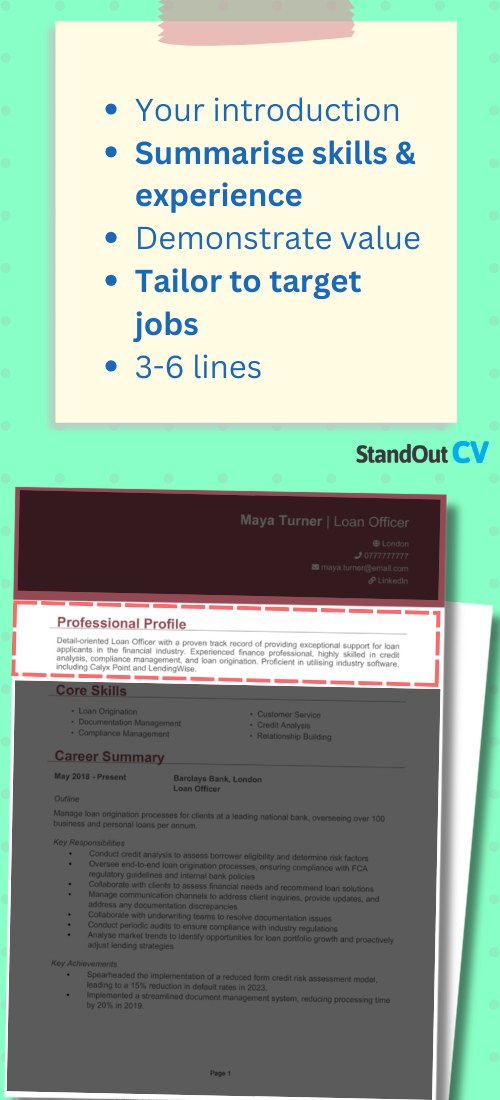
Your CV profile (or personal statement) is the opening paragraph of your application – and a great place to explain your journey into nursing and readiness to begin practising as a newly qualified nurse.
It should give the employer confidence that you’re ready to step onto the ward and contribute from day one, with a foundation of solid training and genuine care for patients. Keep it clear and confident, focusing on the settings you’ve trained in and what kind of team or environment you’re looking to join.
Newly Qualified Nurse CV profile examples
Profile 1
Compassionate and motivated Newly Qualified Nurse with recent clinical experience across medical, surgical, and community placements. Skilled in patient monitoring, medication administration, and delivering person-centred care in line with NHS guidelines. Proficient in electronic patient record systems and confident in working within multidisciplinary teams. Committed to providing safe, high-quality care and continuing professional development.
Profile 2
Diligent and empathetic Newly Qualified Nurse with hands-on training across acute, elderly care, and mental health settings during degree placements. Experienced in clinical documentation, wound care, and basic life support. Strong communicator with a calm and professional approach to patient care. Passionate about delivering holistic nursing and supporting positive patient outcomes.
Profile 3
Reliable and caring Newly Qualified Nurse with a strong academic background and practical experience in NHS hospital and community care placements. Skilled in infection control, patient observations, and health education. Adept at building rapport with patients and families while working under pressure. Focused on developing clinical confidence and contributing to safe, supportive care environments.
Details to put in your Newly Qualified Nurse CV profile
Here’s some tips on what to include:
- Where you’ve worked – Mention hospitals or trusts where you’ve completed placements.
- Your top qualifications – Include your nursing degree and NMC registration.
- Essential skills – Highlight skills like patient care, medication administration, and infection control.
- Experience during placements – Note your exposure to settings like A&E, surgical wards, or elderly care.
- Soft skills and motivation – Show strengths in teamwork, empathy, and communication with patients and staff.
Writing an effective core skills section
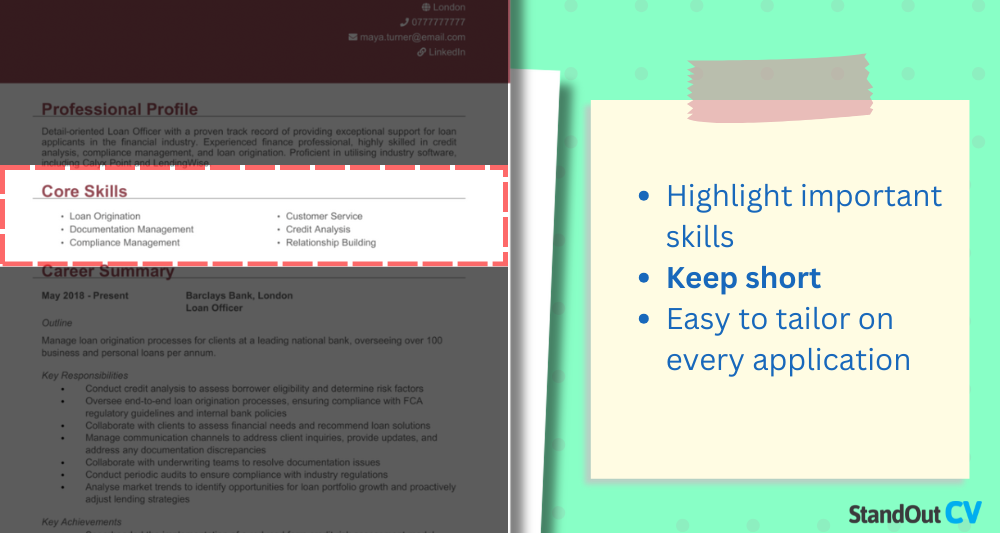
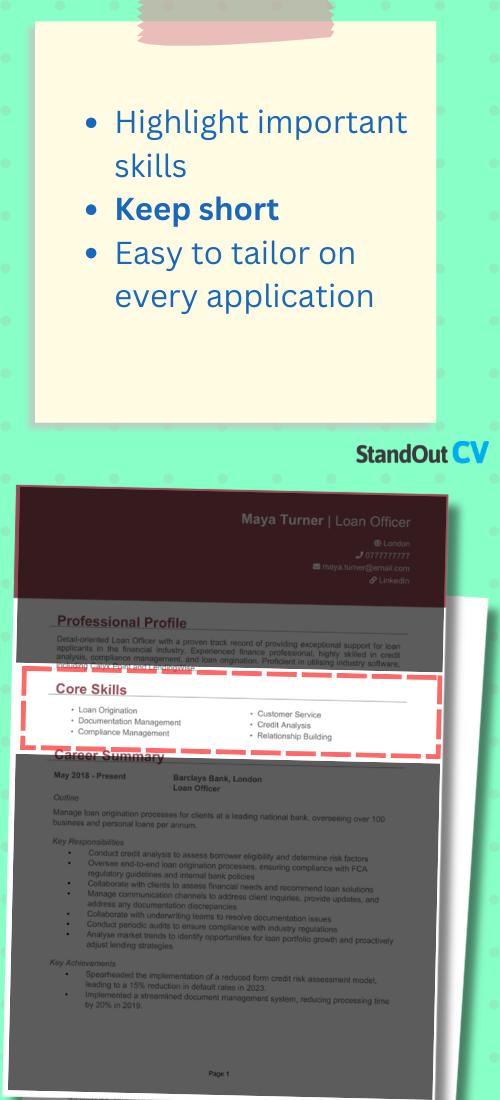
This section provides a snapshot of your clinical knowledge and practical abilities. Even as a newly qualified nurse, you’ve gained a solid base of hands-on experience through placements and simulations.
Tailor the skills for your CV to reflect the requirements of the specific role you’re applying for – whether that’s in acute care, general wards, mental health, or community settings. Stick to succinct bullet points, each focusing on a strength relevant to modern nursing practice.
The top skills to highlight in your Newly Qualified Nurse CV
- Patient Care and Monitoring – Providing direct care, observing patient conditions, and responding to clinical changes promptly.
- Medication Administration – Safely preparing and administering medications, including injections and IV therapy, in line with protocols.
- Clinical Assessments – Conducting routine observations such as vital signs, pain assessments, and wound evaluations.
- Care Planning and Documentation – Developing individualised care plans and maintaining accurate, up-to-date patient records.
- Infection Prevention and Control – Following hygiene protocols and implementing measures to reduce healthcare-associated infections.
- Multidisciplinary Teamwork – Collaborating with doctors, therapists, and healthcare assistants to deliver coordinated patient care.
- Patient Education and Support – Providing information on conditions, treatments, and discharge plans to patients and their families.
- Emergency Response and First Aid – Acting swiftly in urgent situations such as cardiac arrests or deteriorating conditions.
- Safeguarding and Advocacy – Identifying safeguarding concerns and ensuring patients’ rights and well-being are upheld.
- Professional Development – Engaging in reflective practice and continuing education as part of revalidation and career progression.
Showcasing your work experience
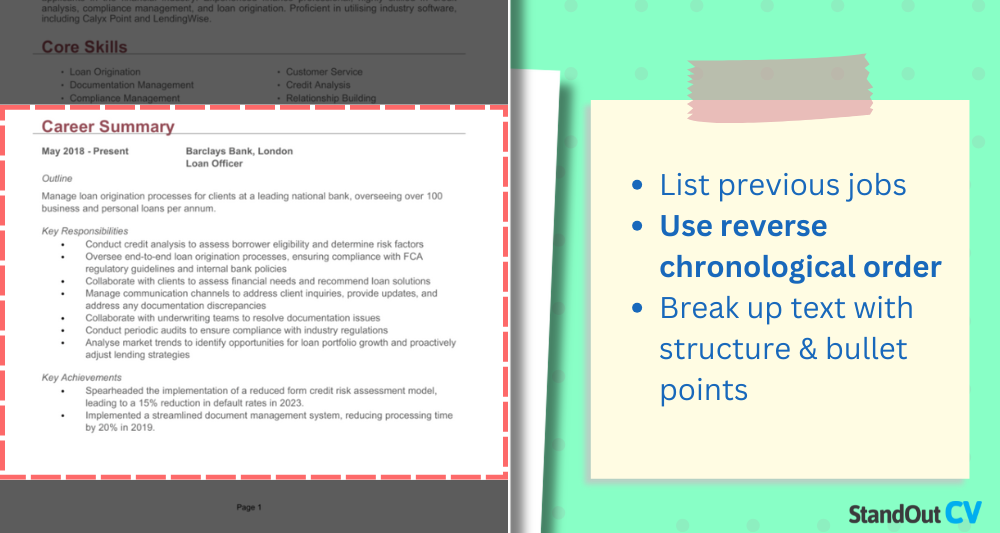
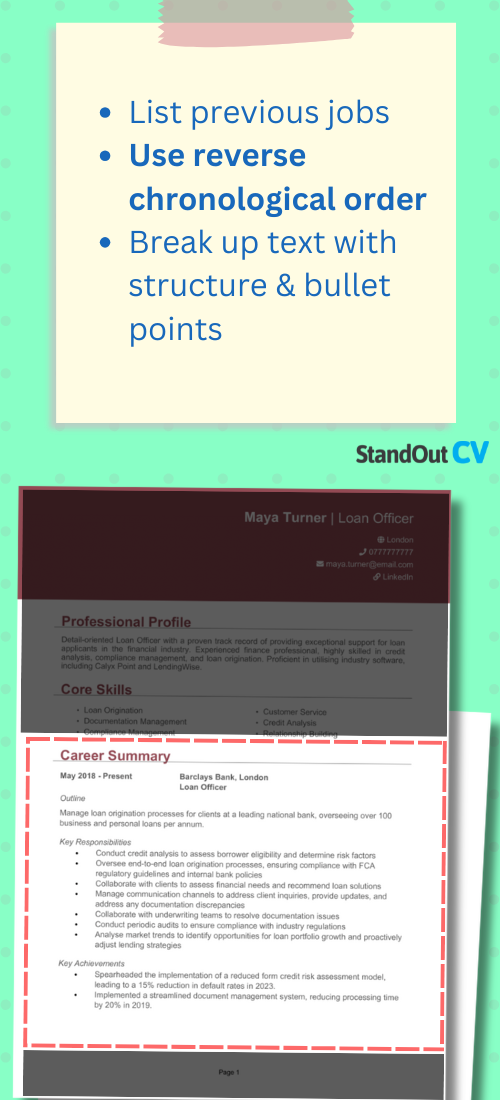
Don’t worry if you don’t have paid nursing experience – your clinical placements count, and they matter. Use this section to describe the responsibilities you took on during training, and how you contributed to patient care.
List placements in reverse order, naming the department or ward, the hospital, and the dates. For each one, explain to recruiters the skills you practised and the settings you worked in – whether it was acute care, paediatrics, mental health, or community nursing.
Writing job descriptions for past roles
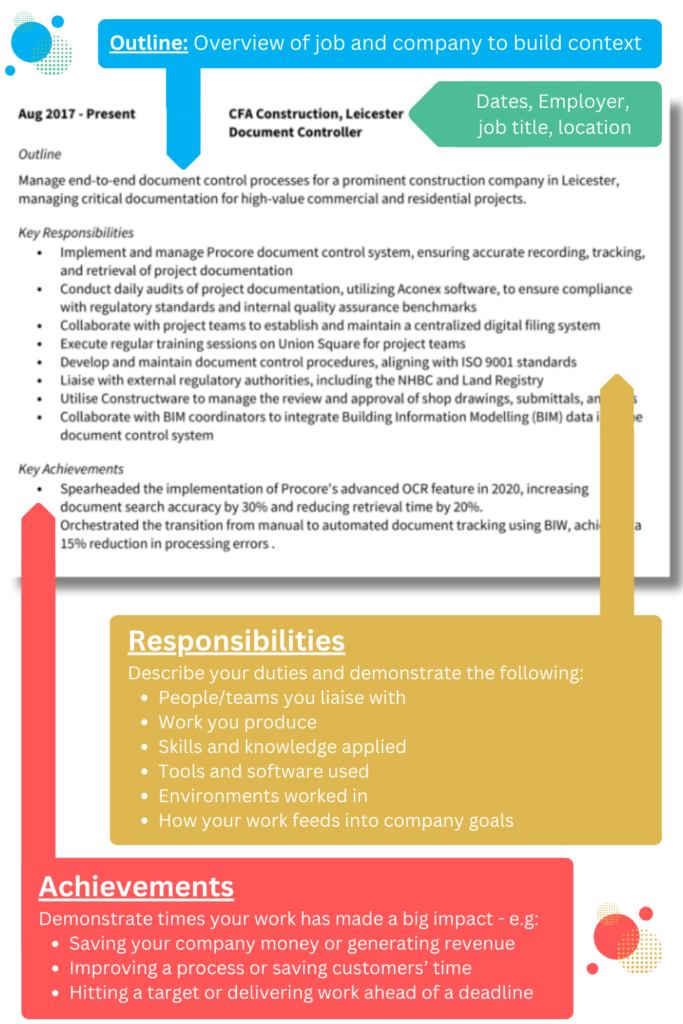
- Outline – Describe the placement, its setting, and your position as a student nurse.
- Responsibilities – Use action verbs like “assisted,” “monitored,” “administered,” or “documented.”
- Achievements – Mention progress made, positive feedback, or instances of patient interaction that helped develop your confidence or skill.
How to present past roles for Newly Qualified Nurse
Student Nurse (Placement) | Hollowfield NHS Trust
Outline
Completed final-year placement on a general medical ward within a busy district hospital, supporting nursing care and developing core clinical competencies.
Responsibilities
- Monitored patient observations, recorded vital signs, and escalated concerns to senior staff.
- Assisted with medication rounds under supervision and supported wound care procedures.
- Provided personal care, helped with mobility, and promoted dignity and independence.
- Updated electronic care plans and completed accurate documentation.
- Collaborated with MDTs to support discharge planning and patient education.
Achievements
- Received positive feedback from mentors for professionalism and compassionate care.
- Helped reduce patient falls by improving communication around mobility needs.
- Completed placement with full attendance and successful final assessment.
Student Nurse (Placement) | Brook Community Health
Outline
Undertook a community placement supporting district nurses with home visits and chronic condition management.
Responsibilities
- Carried out basic clinical tasks including blood pressure checks, dressings, and diabetic care.
- Assisted in managing caseloads, prioritising visits and maintaining records in patient systems.
- Provided health promotion and advice to patients and carers.
- Observed safeguarding procedures and participated in case reviews.
- Supported patients with long-term conditions to maintain independence at home.
Achievements
- Developed strong patient communication and time management skills.
- Recognised by team for building rapport with patients and showing initiative.
- Contributed to early detection of wound infection, supporting prompt intervention.
Student Nurse (Placement) | Stanton Park Institute
Outline
Gained experience in a mental health inpatient setting, supporting patients with anxiety, depression, and psychosis.
Responsibilities
- Built therapeutic relationships through structured conversations and observation.
- Contributed to care plans and observed medication administration sessions.
- Participated in group activities and supported de-escalation techniques.
- Maintained accurate records in accordance with confidentiality and safeguarding protocols.
- Worked closely with mental health nurses, psychologists, and occupational therapists.
Achievements
- Helped reduce patient agitation during group sessions through active engagement.
- Demonstrated consistent adherence to safety procedures and risk assessment protocols.
- Completed mental health placement with strong mentor feedback and successful portfolio sign-off.
Highlighting your education
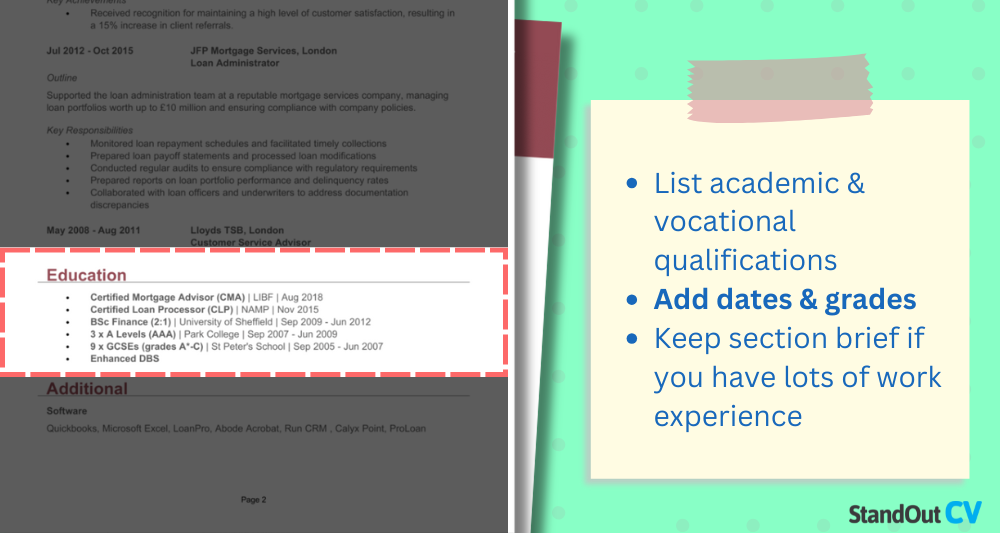
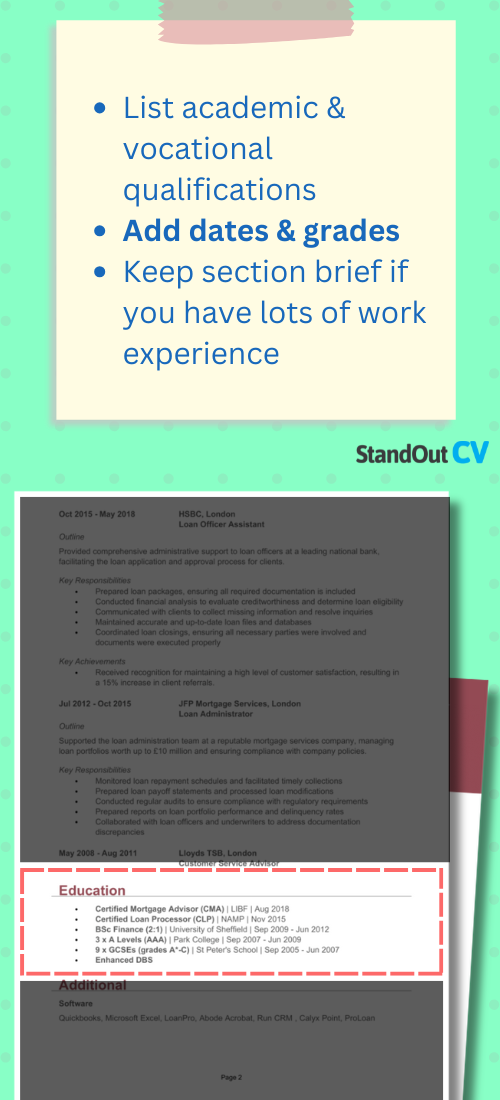
Your education is the foundation of your nursing career, and as a newly qualified nurse, it’ll be one of the most important sections on your CV. List your degree and nursing school, starting with the most recent.
Be sure to include your NMC registration status, any distinctions or awards, and extra training like BLS, manual handling, or safeguarding. This helps reassure employers that you’re ready to meet professional standards from day one.
The best qualifications to boost a Newly Qualified Nurse CV
- BSc (Hons) Nursing (Adult, Child, Mental Health, or Learning Disabilities) – The core qualification required for nursing roles.
- NMC Registration – Mandatory to practise as a nurse in the UK.
- Basic Life Support (BLS) Certification – Essential for patient safety and emergency care.
- Manual Handling and Moving Patients Training – Required for day-to-day nursing work.
- Safeguarding Level 2 (Children or Adults) – Important for protecting vulnerable patients in all settings.


